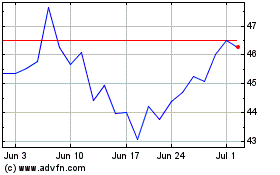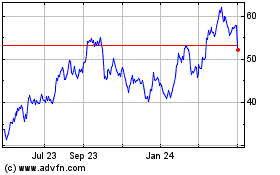By Tim Puko
DELAWARE CITY, Del. -- The oil refinery owned by PBF Energy Inc.
near this Delaware Bay town was mothballed nearly a decade ago.
Today it is running almost full-bore, and PBF and a business
partner are spending $100 million to expand it.
The refinery is seeking to capitalize on new international rules
that require cleaner-burning fuels on the world's oceangoing ships
starting Jan. 1.
U.S. refiners are anticipating a bonanza. The industry estimates
it has spent $100 billion on upgrades in the last decade to make
cleaner fuels, putting it in a position to boost revenues if the
rules raise the demand and prices for the products it makes, as
many expect.
The new rules were met with skepticism by the Trump
administration and others concerned about the impact on jobs and
energy prices. At places like Delaware City, however, the upgrades
required to meet the new standards have translated into more
good-paying jobs, said James Maravelias, president of the Delaware
Building Construction Trades Council.
As car makers and chemical plants have left the region, he said,
refiners have become some of his members' most reliable
employers.
"Energy is pretty much it for us," said Mr. Maravelias, who is
based out of Newark, Del. "There's no other industry that's
bringing in those kinds of jobs to Delaware right now."
At refineries, maintenance work -- usually conducted when the
refinery is shut down -- often employs 1,200 people at a time, Mr.
Maravelias said. And expanding the plant in Delaware City suggests
a future full of even more of those tuneups and more work to go
around, he added.
A rosy outcome isn't certain for everyone affected -- other
sectors, countries and even refiners -- but some analysts and
economists are expecting that a boost for refiners will have a
wide-ranging positive impact. With record U.S. fuel output leading
to more exports and fewer imports, more revenue stays within the
country, often reinvested.
Strong investment usually produces more economic growth than
does strong consumption, said Kevin Book, managing director of the
analysis firm ClearView Energy Partners LLC. So he expects that
U.S. refiners would profit and that rising investment would produce
a net benefit for the economy even if consumer prices rise.
"More money for U.S. refiners is generally good news," Mr. Book
said. "It's awfully hard to argue that in the aggregate this is bad
news."
The marine-fuel rules were imposed by the International Maritime
Organization, an arm of the United Nations, with the aim of
lowering sulfur pollution that can cause respiratory ailments and
aggravate heart disease.
A fast way for ships to come into compliance is to switch to
using more low-sulfur diesel or similar fuels known as distillates.
Many expect that to cause a surge of demand and price increases for
those fuels. While that could help the refiners that make them,
retail consumers could get hit in the pocketbook because that type
of fuel is still widely used as heating oil in parts of the
Northeast.
They could face price increases for diesel and distillates of 5%
to 20% due to the U.N. rules, analysts estimate. That has raised
concerns at the White House about rising energy prices in an
election year.
In October, the White House started a push to soften early
enforcement of the rules, slowing a rollout over several months.
Shares of independent refiners plummeted after The Wall Street
Journal reported the effort.
The full implications of the rules weren't well understood, and
dire initial economic forecasts caused fear, said Mandy Gunasekara,
who was a senior policy adviser at the Environmental Protection
Agency until earlier this year. As people learned more, those fears
receded and officials better understood how the U.S. might benefit,
she added.
"The U.S. is in very good standing because of forward-looking
investments by our refiners," said Mrs. Gunasekara, who now runs a
strategic-communications business.
White House advisers haven't ruled anything out, but they have
stopped actively trying to slow the rollout, according to lobbyists
and analysts familiar with the matter. U.S. officials didn't again
broach the proposal to delay the rules during IMO committee
meetings in London two weeks ago, according to analysts and
interest groups that attended or followed the meetings. That was
the last round of meetings before the sulfur cap takes effect.
"The United States is not seeking to change the existing IMO
2020 deadline that was certified in October 2016. We are continuing
to assess the macroeconomic impacts of implementation to consumers
and industry," a senior administration official said.
More-recent economic changes and forecasts have reduced the
urgency to intervene. Crude prices are down 23% from a four-year
high reached in October.
Crude prices are likely to go lower next year, despite changes
from the IMO, the Energy Information Administration has said in
recent months. It estimates pressure from the new rules could add
about $2.50 to every barrel of international benchmark crude in
2020, but other factors will offset that, causing average prices to
fall. Annual diesel and heating oil prices are likely to go up in
the U.S. by roughly 6% between 2019 and 2020, but won't be far
beyond recent peak prices from the fall of last year, the EIA
estimated this month.
It also predicted those changes will lead to broad gains for
refiners. The EIA estimated in March that pressure from the
marine-fuel rules would help entice U.S. refiners to run at record
capacity and near-record utilization in 2020. And the margins they
make for diesel fuel are likely to rise 35% from this year.
Singapore, the world's largest maritime refueling port, and
several major oil producers have said there would be ample supplies
at major ports.
There is still much uncertainty about the impact of the new
rules, analysts say. While it seems U.S. refiners will benefit,
they have to contend with international competitors who are
spending to catch up. That could cause a supply glut that wipes out
expected profits. While acute supply fears have eased, some concern
lingers. Some observers are worried that extreme shortages could
arise, leading to higher costs punishing consumers and slowing
other segments of the economy.
At Delaware City the rush is on, with 10-hour days and weekend
shifts.
PBF is working with Linde PLC to build a plant that makes
hydrogen, an additive PBF needs to make more of the cleaner-burning
fuels. Workers spent a recent weekend using 40 trucks of cement to
fill a hole 8 feet deep and as big as a football field.
Tiny, shimmering bolts stuck out from the pale gray foundation.
The bolts have to be set precisely and can't be off by more than
1/32nd of an inch. They are used to lock in a structure that
includes a tangle of pipes nine stories high. The project is
scheduled to be completed and operational by next spring, when new
demand is likely to start peaking.
"The U.S. refining sector is actually going to ensure the world
market is prepared," said Brendan Williams, PBF's in-house lobbyist
in Washington. "We hope there's a better understanding of not just
the preparedness, but the benefits...that could happen to the U.S.
economy."
Write to Tim Puko at Tim.Puko@wsj.com
(END) Dow Jones Newswires
May 26, 2019 05:44 ET (09:44 GMT)
Copyright (c) 2019 Dow Jones & Company, Inc.
PBF Energy (NYSE:PBF)
Historical Stock Chart
From Mar 2024 to Apr 2024

PBF Energy (NYSE:PBF)
Historical Stock Chart
From Apr 2023 to Apr 2024
